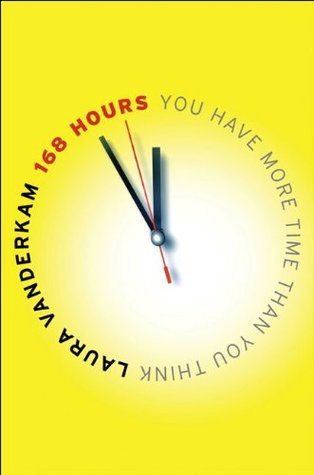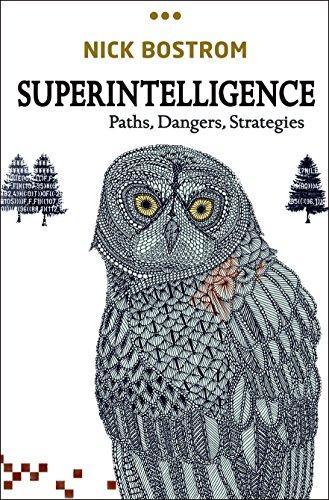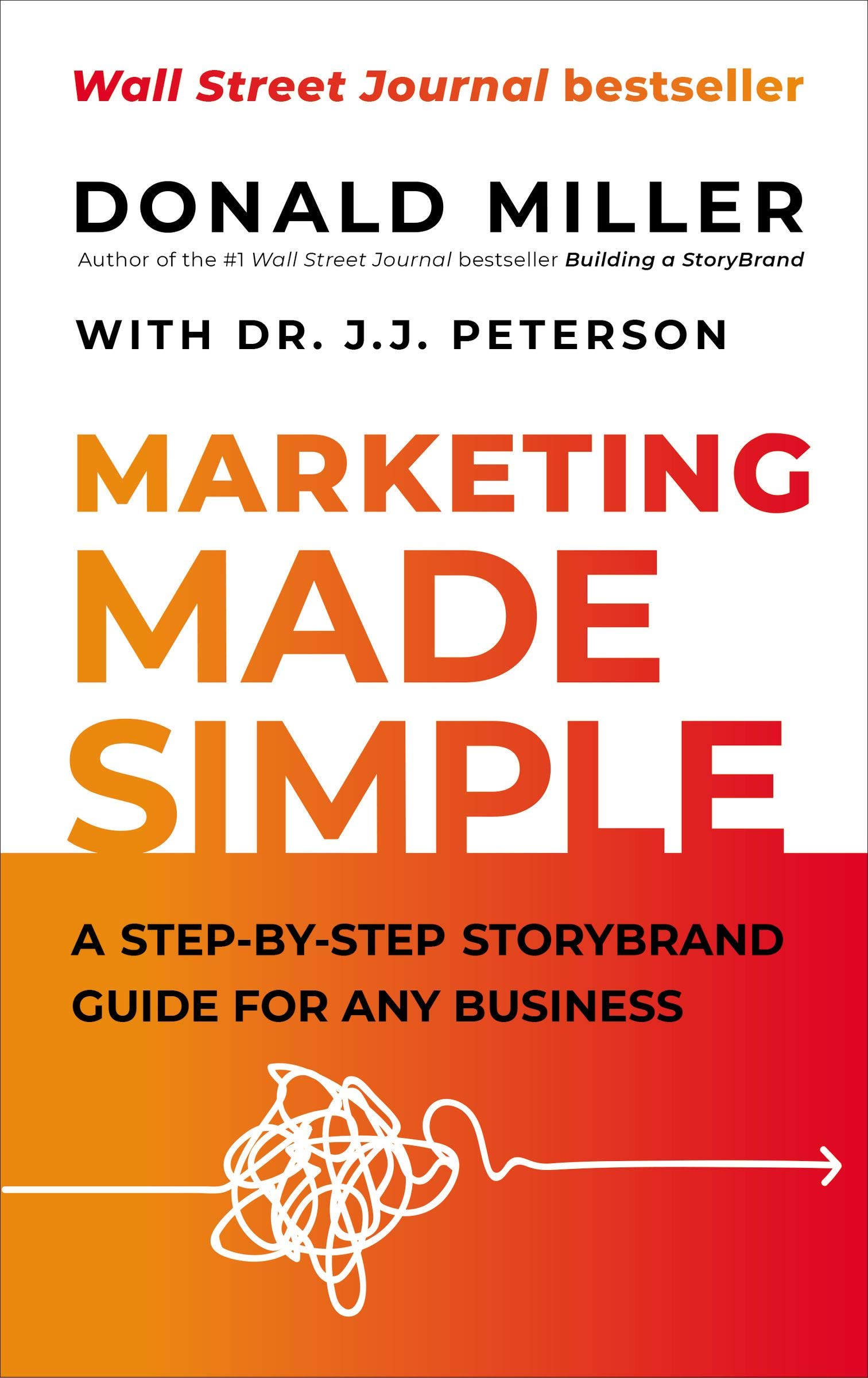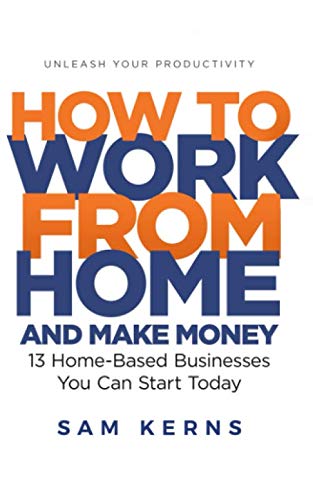InfiniteSummaries rated 168 Hours: 2 stars

168 Hours by Laura Vanderkam
There are 168 hours in a week. This is your guide to getting the most out of them.
It's an …
I review summaries of books (most of them are from 12min.com). That's right. I'm too lazy to read the entire book. I just read the highlights and give you my opinion. These are mostly business or self-help books.
If a summary gets 5 stars, it is highly recommended. I plan to read the full book to squeeze every last bit of tasty juice from it. If a summary gets 4 stars, it is recommended. I might read the full book at some point. A 3-star book has some good stuff in it. Read the actual book if it appeals to you. 2-star books are duds. Skip them! The 1-star books are abominations. Avoid at all costs.
This link opens in a pop-up window

There are 168 hours in a week. This is your guide to getting the most out of them.
It's an …
[My review of the 12min summary]
This is a good look at the history and future of artificial intelligence. It is especially concerned with the possible ramifications of superintelligence, which Bostrom defines as "any intellect that greatly exceeds the cognitive performance of humans in virtually all domains of interest."
Once a superintelligent AI is created, will we be able to control it? Not if it's smarter than us. The dystopian futures of science fiction are cautionary tales. We read those books, watch those movies, then rush madly forward developing these AIs anyway. When the robots start their extermination campaign, we won't be able to say that we weren't warned.
Final Notes (quoted from 12min) "Recommended by everyone from Bill Gates to Elon Musk, 'Superintelligence' is a really outstanding book that covers so much ground in its 400 densely populated pages, there are really just a few AI-related books you’ll need …
[My review of the 12min summary]
This is a good look at the history and future of artificial intelligence. It is especially concerned with the possible ramifications of superintelligence, which Bostrom defines as "any intellect that greatly exceeds the cognitive performance of humans in virtually all domains of interest."
Once a superintelligent AI is created, will we be able to control it? Not if it's smarter than us. The dystopian futures of science fiction are cautionary tales. We read those books, watch those movies, then rush madly forward developing these AIs anyway. When the robots start their extermination campaign, we won't be able to say that we weren't warned.
Final Notes (quoted from 12min) "Recommended by everyone from Bill Gates to Elon Musk, 'Superintelligence' is a really outstanding book that covers so much ground in its 400 densely populated pages, there are really just a few AI-related books you’ll need to read besides it.
"Moreover, it is a very timely book on a very timely subject. 'If this book gets the reception that it deserves,' wrote in a review mathematician Olle Haggstorm, "it may turn out the most important alarm bell since Rachel Carson's "Silent Spring" from 1962, or ever.'
"It’s your job to make sure Bostrom’s book will earn this standing."

The human brain has some capabilities that the brains of other animals lack. It is to these distinctive capabilities that …

A guide for businesses to market their products by email and website.
[My review of the 12min summary]
The book appears to be targeted at online sellers. The authors present their "ridiculously pragmatic" five-step marketing blueprint. This blueprint is based on a series of emails and your website. The book makes a lot of sense. If you're trying to run an online business, this is an excellent book to learn marketing from.
The authors say that an online business relationship follows the same path as an actual human-to-human relationship. These relationships are built slowly and move through three stages: 1. Curiosity 2. Enlightenment 3. Commitment
This is where the five-step marketing blueprint comes in. It guides the customer through this journey.
STEPS ONE AND TWO You draw the customer through the Curiosity stage with the One-Liner and the Website.
The One-Liner has three parts: 1. Start with the problem 2. State the solution in the middle 3. Close things out by revealing …
[My review of the 12min summary]
The book appears to be targeted at online sellers. The authors present their "ridiculously pragmatic" five-step marketing blueprint. This blueprint is based on a series of emails and your website. The book makes a lot of sense. If you're trying to run an online business, this is an excellent book to learn marketing from.
The authors say that an online business relationship follows the same path as an actual human-to-human relationship. These relationships are built slowly and move through three stages: 1. Curiosity 2. Enlightenment 3. Commitment
This is where the five-step marketing blueprint comes in. It guides the customer through this journey.
STEPS ONE AND TWO You draw the customer through the Curiosity stage with the One-Liner and the Website.
The One-Liner has three parts: 1. Start with the problem 2. State the solution in the middle 3. Close things out by revealing the result of the solution
The Website should have most or all of these nine parts: 1. The header 2. The stakes 3. The value proposition 4. The guide 5. The plan 6. The explanatory paragraph 7. The video 8. Price choices 9. Junk drawer
STEPS THREE AND FOUR You then drag the customer through the Enlightenment stage with Lead Generators and Nurture Emails.
The Lead Generator should accomplish the following: 1. Position you as the guide 2. Stake claim to your territory 3. Qualify your audience 4. Create trust by solving a problem 5. Create reciprocity 6. Have an interesting title
The three most common types of Nurture Email campaigns are: 1. Weekly announcements 2. Weekly tips 3. Weekly notification
STEP FIVE Finally, you hogtie your customer with the Sales Email Campaign. There are many approaches to this. Here's one series they suggest: 1. Deliver the asset (the lead generator) 2. Problem + solution 3. Customer testimonial 4. Overcome an objection 5. Paradigm shift 6. Sales email
Final Notes (quoted from 12min) "In the first chapter of 'Marketing Made Simple,' Donald Miller and his contributing writer Dr. J.J. Peterson bemoan the fact that 'most business books are long on theory and short on application' and vow to tell their readers exactly what they should do and in what order to do it so that their marketing works. Anyone who has read 'Marketing Made Simple' would probably agree the two have delivered on their promise.
"The book is not just another theoretical introduction to marketing, but an easy-to-read, step-by-step practical guide to building a marketing platform and growing a company. Simple, specific, and straight to the point, 'Marketing Made Simple' will help anyone who struggles with the execution of a marketing strategy. Especially if you’re in charge of the marketing for your company——to quote Miller and Peterson——consider this your new playbook."
[My review of the 12min summary]
This book was written by Sam Kerns, who seems to specialize in writing and self-publishing how-to-be-self-employed-and-make-money books. This is an average book, at best. Most of the advice appears to be competently credible.
He starts with the top five lies about working from home: 1. You only have to work when you want to 2. You don’t have to answer to anybody 3. You can quit your job immediately 4. You need a college education to start a business 5. Clients won’t take you seriously if you operate your business from home
He then talks about the five online home-based business ideas that he recommends: 1. Virtual assistant 2. Online retailer (I've read elsewhere that Shopify is probably your best bet.) 3. Amazon/eBay seller (I disagree) 4. Indie author (He speaks from experience. This is his gig.) 5. Freelance writing manager
I dispute number …
[My review of the 12min summary]
This book was written by Sam Kerns, who seems to specialize in writing and self-publishing how-to-be-self-employed-and-make-money books. This is an average book, at best. Most of the advice appears to be competently credible.
He starts with the top five lies about working from home: 1. You only have to work when you want to 2. You don’t have to answer to anybody 3. You can quit your job immediately 4. You need a college education to start a business 5. Clients won’t take you seriously if you operate your business from home
He then talks about the five online home-based business ideas that he recommends: 1. Virtual assistant 2. Online retailer (I've read elsewhere that Shopify is probably your best bet.) 3. Amazon/eBay seller (I disagree) 4. Indie author (He speaks from experience. This is his gig.) 5. Freelance writing manager
I dispute number three. I know someone who tried selling stuff on Amazon. The system is rigged heavily against you. Amazon competes with you and undercuts your prices, your Chinese suppliers steal your ideas and sell them direct on Amazon, and the Amazon algorithm is biased in favor of established sellers and Amazon's own products.
He also offers five off-line home-based business ideas: 1. Home-based food business 2. Vending machine business (My uncle did this profitably in the 1970s.) 3. Professional organizing business 4. Renting business (Airbnb) 5. Home cleaning business (Physically demanding and pays $14/hour!)
He then throws in three bonus work-from-home opportunities: 1. Sell online courses to bring in passive income 2. Teach your native language online 3. Earn recurring income with a box subscription service (This is the cleverest business in the whole book. If you have a good imagination, this could be a great niche.)
Final Notes (quoted from 12min) "'How to Work from Home and Make Money' by Sam Kerns is neither original nor particularly thorough, but it can be useful and inspiring.
"If you don’t want to spend your time scouring Google for advice and manuals, this is an okay-ish compilation of 13 home-based business ideas, with pretty elementary step-by-step instructions for each.
"But don’t expect anything more than that."

The book dispels some misconceptions about starting a home-based business. It then describes 13 of the best businesses (both online …
[My review of the 12min summary]
(Actually, there are no snakes in this book.)
This book was written way back in 1905. Wikipedia says "it was the first truly authoritative biography of Saint Patrick." Supposedly Bury approached his subject from a historical perspective instead of a religious one. This summary, at least, bears this out.
I found the book quite interesting as history. It tells the story of St. Patrick's life and how it fit into European history at the time. His biggest impact, of course is how he converted Ireland from paganism to Christianity. Whether that is a good or a bad thing I will leave as an exercise to the reader. No matter where you fall on that question, this book is still worth looking at if you have an interest in the subject.
Final Notes (quoted from 12min) "While St. Patrick was not the first to introduce …
[My review of the 12min summary]
(Actually, there are no snakes in this book.)
This book was written way back in 1905. Wikipedia says "it was the first truly authoritative biography of Saint Patrick." Supposedly Bury approached his subject from a historical perspective instead of a religious one. This summary, at least, bears this out.
I found the book quite interesting as history. It tells the story of St. Patrick's life and how it fit into European history at the time. His biggest impact, of course is how he converted Ireland from paganism to Christianity. Whether that is a good or a bad thing I will leave as an exercise to the reader. No matter where you fall on that question, this book is still worth looking at if you have an interest in the subject.
Final Notes (quoted from 12min) "While St. Patrick was not the first to introduce Christianity to Ireland, he changed the shape of Christendom forever. With his missionary work in Ireland he firmly positioned Ireland within the larger framework of Europe and the world at the time."
[My review of the 12min summary]
Daniel Gilbert is a social psychologist and professor at Harvard. He specializes in affective forecasting, which is the brain's ability to predict whether it will be a happy brain or a sad brain in the future.
This is a good book. It describes the ways your brain is incapable of predicting the future and remembering the past. Most people think that their memories are accurate. They're not! Stop believing that crap! Your brain is failing you! It's a bigger disappointment than your no-good son who dropped out of college and now plays video games in your basement.
Final Notes (quoted from 12min) "You are unable to predict the future correctly, or even to remember events accurately. Since the brain needs to economize, it automatically fills in details of past and future experiences, while leaving other details out. It is also incapable of accurately imagining …
[My review of the 12min summary]
Daniel Gilbert is a social psychologist and professor at Harvard. He specializes in affective forecasting, which is the brain's ability to predict whether it will be a happy brain or a sad brain in the future.
This is a good book. It describes the ways your brain is incapable of predicting the future and remembering the past. Most people think that their memories are accurate. They're not! Stop believing that crap! Your brain is failing you! It's a bigger disappointment than your no-good son who dropped out of college and now plays video games in your basement.
Final Notes (quoted from 12min) "You are unable to predict the future correctly, or even to remember events accurately. Since the brain needs to economize, it automatically fills in details of past and future experiences, while leaving other details out. It is also incapable of accurately imagining you in a different situation from the one you are in right now.
"The easiest way to overcome these shortcomings of the brain is to listen to the advice of others. Also, when planning for the future, remember that upon looking back, you will regret the things you did not do, while you will learn from any mistakes you made."